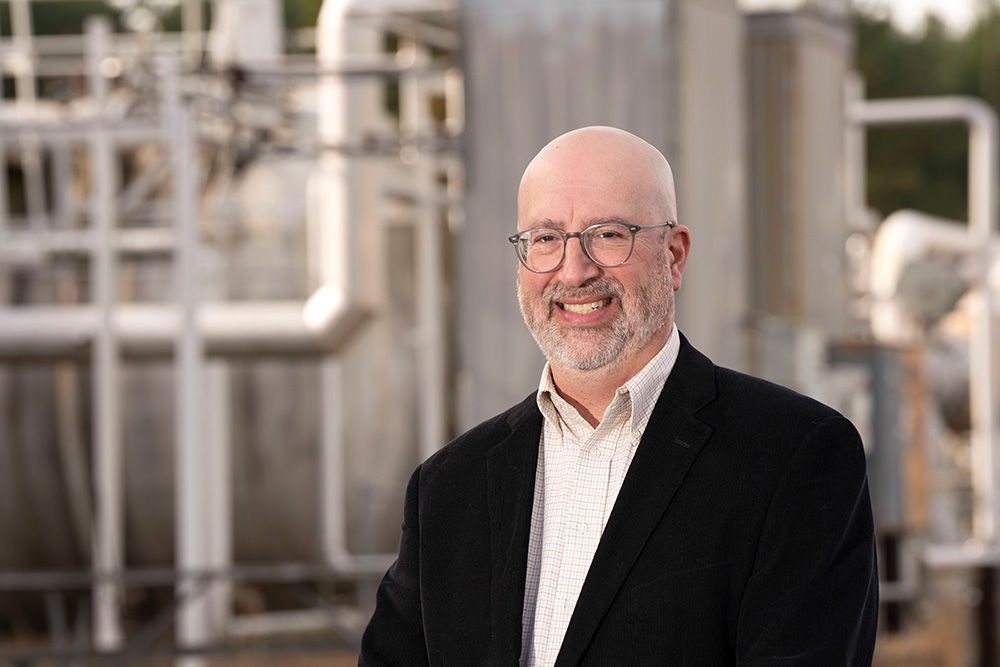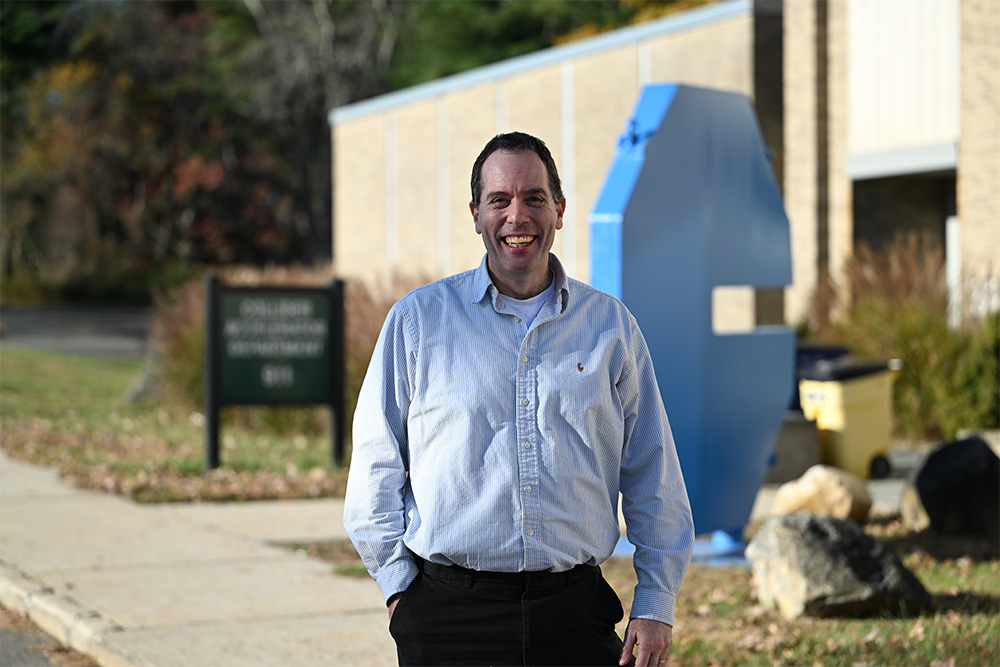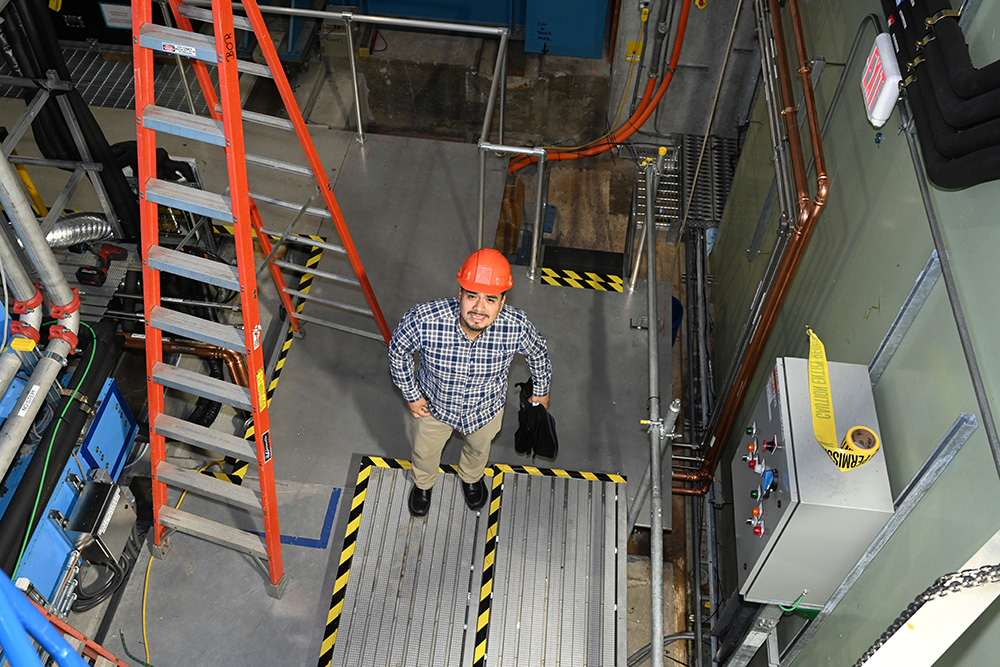Meet the 2023 Engineering Award Recipients
September 27, 2024
Engineering Awards are presented to recognize distinguished contributions to the Laboratory's engineering and computing objectives. The 2023 recipients were:
David Bergman, National Synchrotron Light Source II

David Bergman, an electrical engineer at the National Synchrotron Light Source II (NSLS-II), was honored with the Engineering Award for his 34-year career contributions, including work for NASA and NIST, and particularly for the development, commissioning, operations and upgrades of NSLS-II's high-power systems. Delivering, sustaining and evolving safe, reliable and stable operations of the facility in the past decade is a direct conclusion of David’s diligent work and his engineering ingenuity. A key achievement is his role in developing the Storage Ring Dipole Power Supply, showcasing expertise in precision control circuits for remarkable long-term stability. David enhanced reliability and serviceability in Booster Dipole and Quadrupole power supplies, with diagnostic systems improving troubleshooting and operational efficiency.
The modular design of NSLS-II Booster Quadrupole Power Supplies, conceptualized by David, has operated flawlessly for over five years. His commitment to safety is evident in the design of the Automatic Transfer Switch Diagnostic Measurement System. David's forward-thinking approach in developing next-generation compact Bipolar Power Supply designs enhances efficiency and performance, contributing significantly to NSLS-II's success and earning him this Award.
Russell Feder, Collider-Accelerator Department

Principal mechanical engineer Russ Feder was awarded the Engineering Award for his exemplary leadership as sPHENIX Chief Mechanical Engineer and Head of the sPHENIX Integration Office (2019-2023). Leading a diverse team, Russ showcased exceptional management and engineering skill by overseeing the design, fabrication and installation of sPHENIX detector subsystems. A notable achievement was managing the intricate installation of the superconducting solenoid within the Outer Hadron Calorimeter/Flux return.
Russ's leadership played a pivotal role in the on-time, on-budget completion of sPHENIX, the first new Relativistic Heavy Ion Collider (RHIC) experiment in over two decades. This success, amid pandemic and supply chain challenges, demonstrates his exceptional ability to overcome adversity. The completion of sPHENIX has broader implications, justifying RHIC operation from 2023 to 2025 and reinforcing Brookhaven’s engineering capabilities. sPHENIX also showcases inter-departmental cooperation, strengthening the Lab's position in the Electron-Ion Collider site selection process.
John Kuczewski, Instrumentation Division

John Kuczewski, a technology engineer in the Instrumentation Division, was honored with the Engineering Award for his exceptional contributions to the design, development, and implementation of the sPHENIX Time Projection Chamber (TPC) readout system. His engineering prowess is evident in the intricate design of the sPHENIX TPC readout, incorporating custom ASICs, FELIX computer interfaces, and over six hundred custom Front End Electronic (FEE) boards.
A standout achievement is John's adaptation of the SAMPA ASIC for sPHENIX, demonstrating his ability to navigate custom non-commercial components. Managing 624 FEE boards connected to 24 FELIX boards, his custom firmware ensures seamless data transmission and real-time control integration with the sPHENIX trigger and timing system.
Beyond technical development, John actively contributes to bench tests, Fermilab beam tests, and plays a critical role in commissioning the TPC and TPC Outer Tracker. His comprehensive involvement and mastery of high-speed logic design make him instrumental in the success of the sPHENIX experiment, solidifying its flagship status at RHIC from 2023 to 2025.
Seth Nemesure, Collider-Accelerator Department

Seth Nemesure, IT manager I and leader of the Controls Applications Group at the Collider-Accelerator Department (C-AD), was honored with the Engineering Award for his 25 years of exceptional technical contributions and leadership. His innovative software design and leadership in complex control systems have significantly impacted C-AD and the broader accelerator community. Seth's achievements include designing crucial controls interfaces for RHIC and AGS polarimetry, ensuring efficient system management. Leading the Controls effort for NSRL for over a decade, he showcased expertise in dosimetry software and user interfaces.
A notable accomplishment is Seth's 2013 redesign of the electronic logbook (elog), central to C-AD operations, gaining international recognition for its functionality. His commitment to advancing control systems is evident in exploring new technologies, contributing significantly to the 2019 ICALEPCS conference. Proficient in C++, Java, and Python, Seth's work not only benefits C-AD and Brookhaven Lab but elevates the Laboratory's international reputation.
Joel Vasquez, Physics Department

Joel Vasquez, an electrical engineer I in the Physics Department, was honored with the Engineering Award for his exceptional contributions to the sPHENIX electrical infrastructure, safety system, controls, and interlocks. Joel upgraded the power distribution system to current standards with precision, employing remote contactors for centralized rack power control, streamlining construction and ensuring safety compliance.
In control systems, Joel designed a versatile second-generation system using programmable logic controllers, adapting swiftly to evolving standards. His commitment to safety is evident in the robust interlocks and alarms integrated into the control system, ensuring equipment protection.
Joel's leadership in implementing these complex systems, coupled with efficient resource management, significantly contributed to the sPHENIX experiment's success. His achievements, from conceptual design to construction supervision, not only met Nuclear Science Advisory Committee Long Range Plan demands but crucially advanced RHIC’s goals, marking a significant step forward.
2024-22112 | INT/EXT | Newsroom









